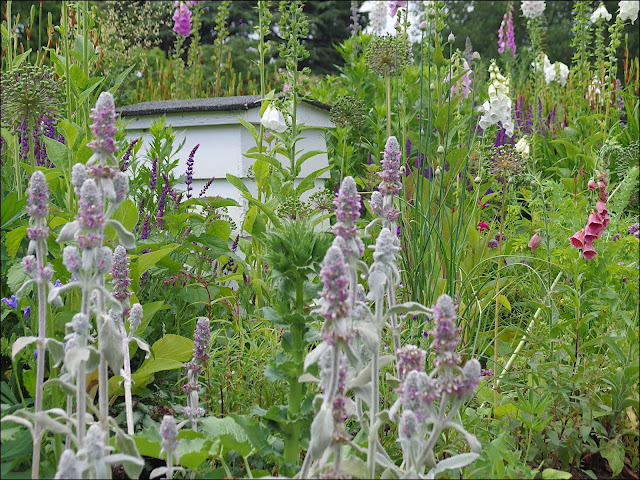Like any other garden, the University's Botanic Garden in Cambridge would be nothing without the tireless efforts of an army of workers.
No, not the human workers, though they are certainly busy at this time of year too, but the countless thousands of bees who slave away from dawn till dusk, collecting nectar and pollinating the plants.
And they were certainly out in force yesterday - making honey while the sun shines, I suppose.
All along in front of the Glasshouse Range, in one of the most prominent positions on the site, are the specially created Bee Borders, full of the plants that are most attractive to the busy insects.
And there are hives full of honey bees right in among the flowers; accommodation on the job, so as to speak.
The borders are not only ideal for the bees, they look very pretty too, and the hope is that visitors will be inspired to plant up their own gardens with similar flowers. There's even a list of suitable plants which you can pick up on your way out.
The flowers you'll see here vary throughout the summer, but there is a constant supply of nectar for the bees. At present the borders have a strong vertical emphasis created mainly by the towering spikes of foxgloves and delphiniums.
As well as the important research carried out by the University, the gardens also provide information boards to enlighten less knowledgeable visitors.
Although many of these boards are clearly designed with children in mind, grown-up explorers can learn a lot too. Well, did you know that plants like foxgloves have a lower lip specially designed as a landing-pad for bees? Not only is it a convenient perch, but it has cone-shaped cells which give the bee a better grip as it alights on the plant.
Yes, there are lots of other plants too; I just got rather carried away with photographing foxgloves.
All in all it's a paradise where bees and other pollinating insects can live out their brief but important lives - and it's an extremely pleasant place for us less industrious individuals to while away an hour or two.
Human visitors come here from all over the world and yesterday there was also an insect that had made quite an impressive journey on beautiful but delicate wings...
It's a Painted Lady butterfly, the first I've seen this year, looking rather washed out and tatty after flying over from mainland Europe. Apparently there's been quite an influx of them along the coast in the last week or two. Maybe we'll have another bumper year for them during 2019.
Take care.













I really do hope that visitors will be impressed with this natural beauty, and realize that it is the way it should be, and be motivated to replicate this type of garden at home. The fact that a list of plants is provided should be very helpful in this regard. The degree of pollination going on is encouraging in every way.
ReplyDeleteBeautiful shots, John.
ReplyDeleteBeautiful images John. Not seen a Painted Lady yet.
ReplyDeleteWhen I watered the garden this evening, I walked into a congregation of bees. Scary at first but they left me alone. Don’t know what attracted them to that area of the garden. Will have to research it.
ReplyDeleteWonderful photos John. There is something special about foxgloves.
ReplyDeleteI didn't know about the 'landing-pad' for bees. Isn't that wonderful?
ReplyDeleteThese photos are such a joy to see - all of those lovely soft pinks, mauves and blues. Even amongst these wet June days there are still lovely things to enjoy and appreciate as you have shown.
ReplyDeleteHi John - brilliant photos ... love them all. Great the Garden has put the beehives amongst the plants ... so there's no distance for the bees to fly to find nectar. Amazing ... these gardens are always gorgeous to see and know about ... excellent planting too = cheers Hilary
ReplyDeleteWhat was I struck by? The phrase "mainland Europe." Why I'd never heard it before escapes me. But of course it is, and I will now consider the island you live upon more seriously!
ReplyDeleteThe flowers there are so beautiful. I love the conscious effort to attract the bees. I didn't know about the foxglove landing pad for bees. Nature at its best! There was a huge migration Painted Ladies in California in March. The abundant rainfall brought lots of flowers and butterflies in the MILLIONS!
ReplyDeletehttps://www.nytimes.com/2019/03/17/us/migrating-painted-lady-butterflies.html
We get a few of them every year - sometimes I see one or two, sometimes not - though about ten years ago we had a major influx of them.
DeleteBeautiful photos, John. The flowers are such a pretty sight to see and I guess the bee in your second photo would agree.
ReplyDeleteI love that 3rd last shot that looks like a thistle!
ReplyDeleteI was just telling Roger I wish there was a Botanical Garden near us. You sure got some beautiful shots...I love the foxgloves so completely understand why you enjoyed photographing them.
ReplyDeleteI love all the flowers the bees love, especially the foxgloves and the borrage. Lovely photos of them all:)
ReplyDeletePurple is a beautiful. color for flowers and you have a nice number of varieties to photograph. So pretty!
ReplyDeleteI love to see flowers, any time, any where! Your photos make me anxious for winter to be gone so I can get back to tending my garden :) Nice image and thanks for the great narration.
ReplyDeleteMy Corner of the World
It is striking how many are purple, pink or white.
ReplyDeleteI haven't seen a painted lady yet this year, though I keep hearing that there are lots of them around! A beautiful collection of photos, I'd love to have a garden looking something like that!
ReplyDelete